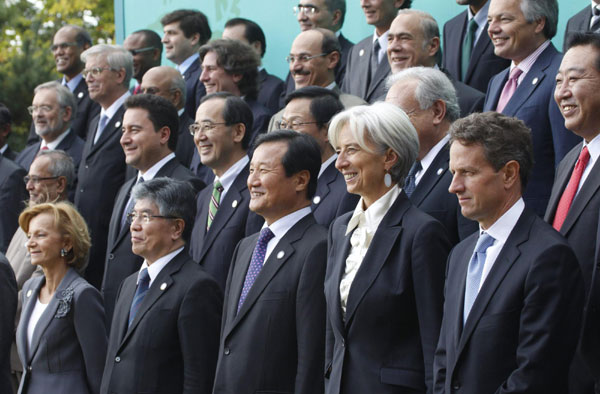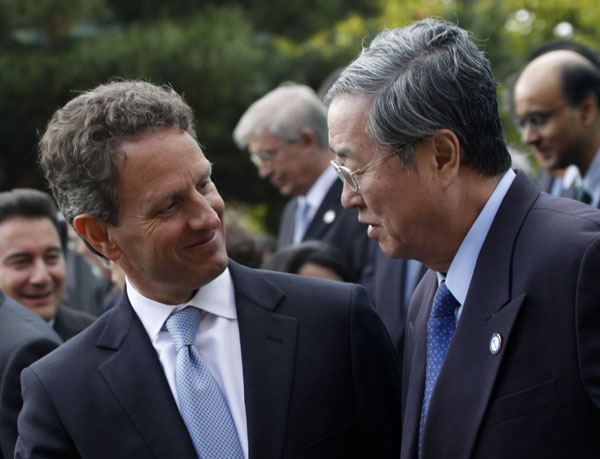Global General
G20 ministers to finalize agenda in Seoul Summit
(Xinhua)
Updated: 2010-10-22 17:06
 |
Large Medium Small |
GYEONGJU, South Korea - The G20 finance ministers and central bank governors' meeting kicked off Friday, seeking to review and finalize issues to be tabled at the upcoming G20 Seoul Summit.

| Spain's Economy Minister Elena Salgado, Bank of Korea Governor Kim Choong-soo, South Korea's Finance Minister Yoon Jeung-hyun, France's Economy Minister Christine Lagarde and US Treasury Secretary Timothy Geithner (front row, L to R) pose for a group photograph during the G20 Finance Ministers and Central Bank Governors meeting in Gyeongju, southeast of Seoul, Oct 22, 2010. [Photo/Agencies] |
Hosted by G20 chair South Korea in the city of Gyeongju, the two-day ministerial gathering is scheduled to check up all the agenda items to be discussed at the upcoming G20 Seoul Summit.
Ahead of the meeting, some of the participant leaders, such as South Korean Finance Minister Yoon Jeung-hyun and US Secretary of Treasury Timothy Geithner, held bilateral talks, which were known to focus on the thorny global currency tension issue.
The meeting started at local time 3:00 pm (0600 GMT) with an opening speech by South Korean President Lee Myung-bak.
|
|||
Meanwhile, the first session is to be spent on global economy, where participants are known to diagnose and share views on the current economic recovery pace.
The session, in particular, is scheduled to be mostly dedicated to discussions on the issue of currency and international trade, which has been the dominant topic of the global community lately.
Held amid a sharper-than-ever conflict on foreign exchange policies, the event has been grabbing global attention on how the members will discuss, coordinate, and settle the currency issue.
The currency conflict began as the US announced to expand its stimulus package by conducting quantitative easing, which would further devalue its currency.
The policy was chosen in a bid to stand up against China as it refused to take in the US claim that the renminbi be appreciated. Experts have been worrying it may lead into a trade war as countries may keep choosing to take trade protectionist measures.
In the face of the deepening trouble, South Korea, as chair country, has been repeatedly stressing it will do his best to see a breakthrough in the currency tension.
Following the session, the leaders will gather for a dinner meeting where they are expected to share views on the issue in a more casual mode.
Wrapping up the first day's schedule, the participants will meet again Saturday for more in-depth talks, scheduled to have sessions of the IMF reform and Global Financial Safety Nets (GFSN), the Framework for Strong, Sustainable and Balanced Growth, Financial Regulatory Reform and other issues.
The IMF quota reform is another hot item at the meeting, on which advanced and emerging economies still seem to be in stark contrast.
Media is also paying attention to whether leaders could make progress in terms of the Framework, where countries are having trouble to balance and coordinate country-level needs and economic conditions in developing detailed plans.
The event will end with a press conference by the chair, where South Korean finance minister will announce a joint communiqu, based on which will be the agenda of the Seoul Summit.

| US Treasury Secretary Timothy Geithner (L) talks with People's Bank of China Governor Zhou Xiaochuan during a delegate reception in the G20 Finance Ministers and Central Bank Governors meeting in Gyeongju, southeast of Seoul, Oct 22, 2010. [Photo/Agencies] |



